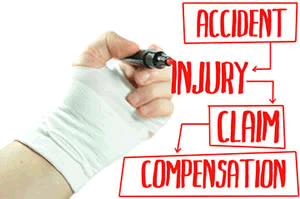Injury denied work compensation?
Recently on our legal forum a user asked, “I was injured at work while I was climbing up a ladder. My company has refused to pay for my medical bills or give me workers compensation. Is this legal? When does the company have the right to deny workers’ compensation benefits?”
What is workers’ compensation?
Workers’ compensation is employment purchased insurance which pays medical and wage benefits to employees who are injured while performing their normal job duties.
Workers’ compensation eliminates the need for an injured employee to file a personal injury claim against an employer and prove the employer was negligent. The employer, while required to pay for medical expenses and wage benefits, is generally protected against having to fight protracted and lengthy personal injury claims.
Why would an employer deny your work comp case?
Like all insurance policies, the goal of the insurer is to avoid paying benefits – which costs them money and leads to higher premiums for the employer. With this in mind, there are a variety of reasons your work comp claim may have been denied.
- The employer does not believe you are really injured or that your injury is as serious as you claim.
Certain types of injuries, especially those which are repetitive or which cannot be completely validated through medical evidence, may create doubt to the seriousness of your claim. Employer’s seem to have a strong bias against certain claims, arguing that the employer may simply be gaming the system for their own financial gain.
- The employer claims the injury did not occur at work or the action which caused the injury was not within the scope of your normal job duties.
There are certain times when an injury is not covered. For example, if you are driving to and from work and you are injured, unless you are travelling to multiple job sites, this injury may not be covered. Talk to a lawyer if you have questions.
- No one witnessed your injury or can substantiate it occurred at work.
While it’s best to have a roomful of employees witness your accident or injury, this is not always possible. Maybe you climbed a ladder in the warehouse, fell off, and no one witnessed it? Regardless of what happened, if you are injured and there is not a witness, you will need to tell your boss immediately and make sure an injury report is filed.
- You failed to immediately report your injury to your employer.
Legally you are required to report your injury within a specified number of days. If you fail to report your injury within the statute of limitations your employer is likely to deny your claim arguing that it either did not occur or it was not as serious as you claim.
- Medical records cannot validate your injuries.
Unfortunately, even the best medical testing cannot always validate pain or injury. Your best course of action is to make sure that you report the same story to all parties and get the best medical care possible.
- You were injured while you were intoxicated or on drugs.
If you are injured at work while you intoxicated, you can expect to have your claim denied. You can talk to your lawyer about your options, but legally your employer probably will not be liable for your injuries.
- You were not an employee at the time your injury occurred.
If you were injured after your employment was terminated or you were classified as a contractor, your employer may be able to legally deny your work comp benefits.
- You did not seek immediate medical attention for your injury.
Failure to mitigate your injury or seek proper medical care can result in a work comp denial of benefits.
- You were injured while engaged in horseplay or another unauthorized activity.
Work comp laws regarding Injuries which occurred while you were engaged in misbehavior may vary by state. If you have questions about your actions or if the negligent actions of another person caused your injury, discuss your case with a work comp lawyer.
What should you do if your workers’ compensation claim is denied?
Unfortunately, honest, injured employees sometimes do have their legitimate work comp claims denied. So what should you do if your claim is denied? Do not give up. First, you can contact your employer’s work compensation insurance carrier and discuss your case with them.
If you have followed the proper procedures to appeal the denial of your claim and your employer continues to refuse to pay your claim, you can contact a work comp lawyer. Your lawyer can provide information about the next legal steps you need to take, one of which may be to request a hearing with the state workers' comp board
Related Pages
Latest Question
Could you please qoute me a estimated cost on filling for bankruptcy?
The cost of bankruptcy will depend on whether you hire a lawyer and which bankruptcy you file.
Category: bankruptcy



